If you’re a cat lover and a plant lover, you have an obligation to make sure you keep your cats safe from any toxic plants that can harm them. You might notice your cat is interested in tomato plants when planting vegetables. So you can’t help but wonder, are tomato plants poisonous to cats?
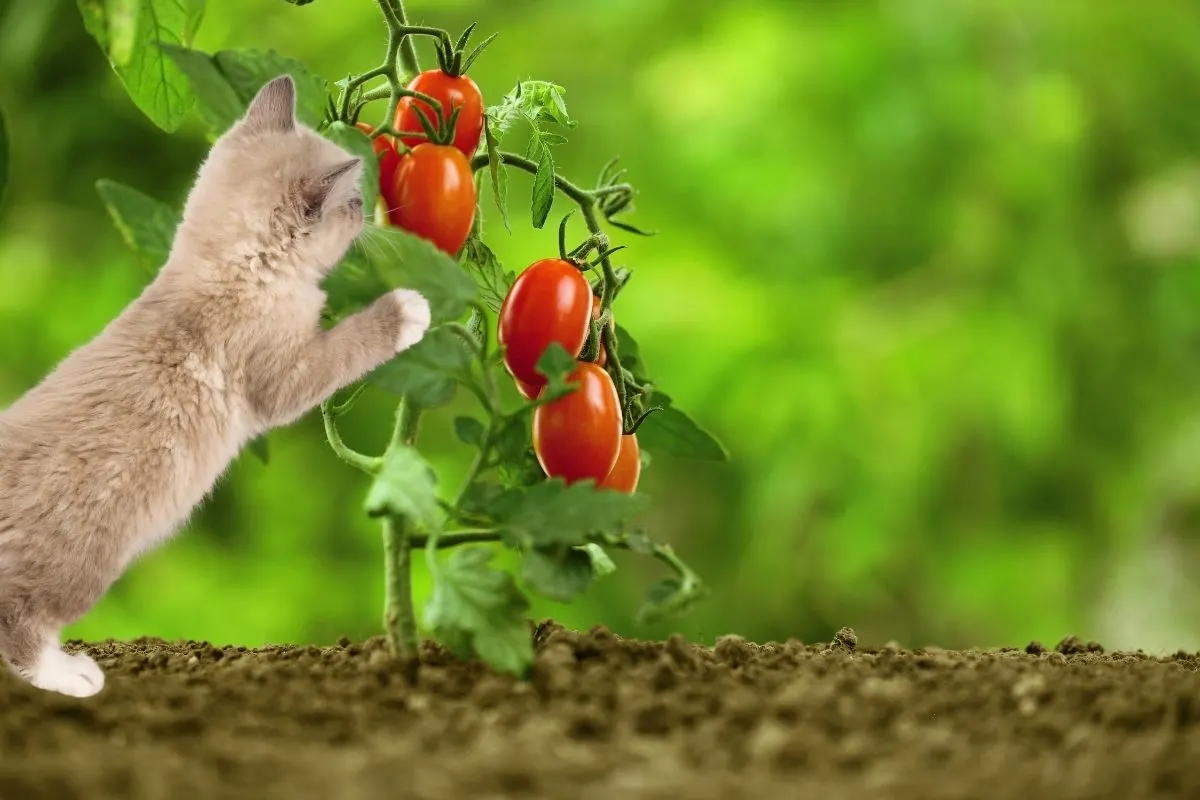
There are many reasons why people decide to start gardening their own vegetables. Getting older means you have to live a healthy life. But living healthy can cost a lot of money, so to get wholesome vegetables, you might consider growing a vegetable garden. Other people grow their own veggies in order to have more control over what they consume and to avoid chemicals that may come with store-bought vegetables. And for others, it’s a fun hobby that they enjoy, and being able to eat the food is just a fun bonus.
Whatever the reason you garden, there are some things you should know about tomatoes if you also have a cat. There are many poisonous plants that can hurt your pet cat if he comes into contact with them. For some, he needs to actually ingest them. But some plants can cause harm when they are nearby or if your cat rubs against it or breathes it in.
It’s very important as a pet owner that you keep your cat safe from poisonous plants. With that in mind, let’s take a look at what, if any, dangers come from tomatoes.
Are Tomatoes Toxic to Cats?
Yes, the entire plant can be toxic to cats. Both the green parts of the tomato plant and the unripe tomatoes are poisonous to cats. The tomato plant contains toxic chemicals called solanine and tomatine, which when ingested by cats can cause gastrointestinal complications (stomach upset), a slower heart rate, and lethargy.
However, tomatoes aren’t always poisonous to cats. Your cat may ingest completely ripe parts of the plant without any harmful or life-threatening effects. You will even find that some cat food manufacturers use tomatoes in their food.
Tomato plant poisoning in cats happens when the cat ingests the toxins found in the green parts of the plant or the unripe fruit. These contain solanine and alpha-tomatine that are toxic to your cat.
Are Unripe Tomatoes Poisonous To Cats?
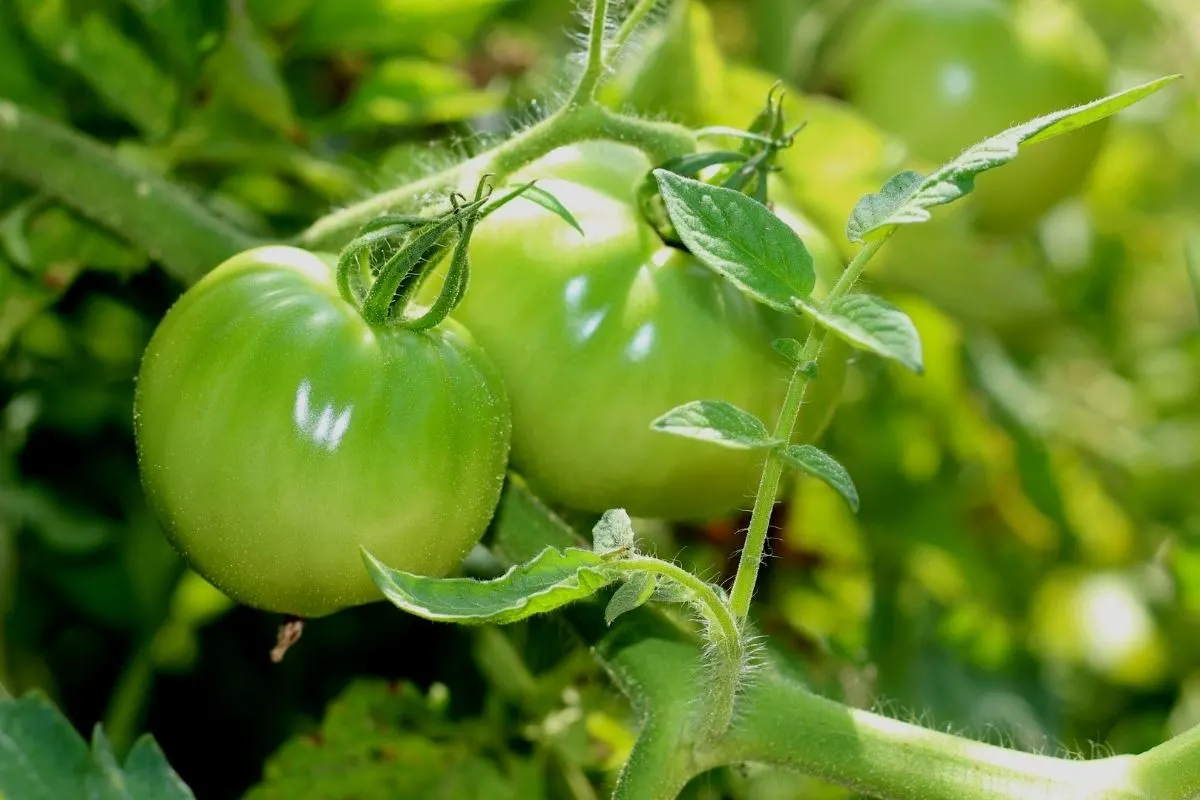
You have no idea why your cat would want to take a nibble at your tomato plant; what seems to interest them so much? The only possible answer I can think of is curiosity. Unfortunately, curiosity also leads to your cat ingesting certain things they shouldn’t.
Cats who are bored or who have easy access to the plants are much more likely to try to eat them.
The tomato plant, potatoes, eggplants, and others are all part of the nightshade plant family. The nightshade plant family all produce a toxic alkaloid that can be harmful and even deadly to many creatures, including cats if ingested.
An averaged sized domestic cat weighs between 8 and 10 pounds (3.6kg – 4.5kg) and has to consume around 0.0105 ounces (3 g) of green tomato fruit, stems, leaves, or roots of the tomato plant to become ill. It might seem like a lot, but your cat might have a low tolerance toward solanine or tomatine.
The unripe fruits, green stems, roots, and leaves of the tomato plant contain a more significant amount of solanine than a ripe tomato. As a tomato ripens, the toxic alkaloids lessen and become safe for your cat to eat. If your cat may have eaten any part of the tomato plant, you need to take it to your vet without delay.
Tomato-based products to also avoid
Aside from the actual plant, the following are also poisonous and contain added ingredients and chemicals poisonous to cats. It is advisable not to leave these open or on counters where your cat can reach them.
Cats will not seek them out, but if you leave them accessible to your cat, he will investigate and might have a bite or a taste of them. As pet owners, we have an obligation to keep our furry friends safe. They trust us to keep poisons and toxins out of their environment.
Be sure to prevent access to the following:
- Tomato soups
- Ketchup
- Tomato juice
- Tomato gravy
- Tomato-based sauces
- Tomato paste
Can Cats Eat Ripe Tomatoes?
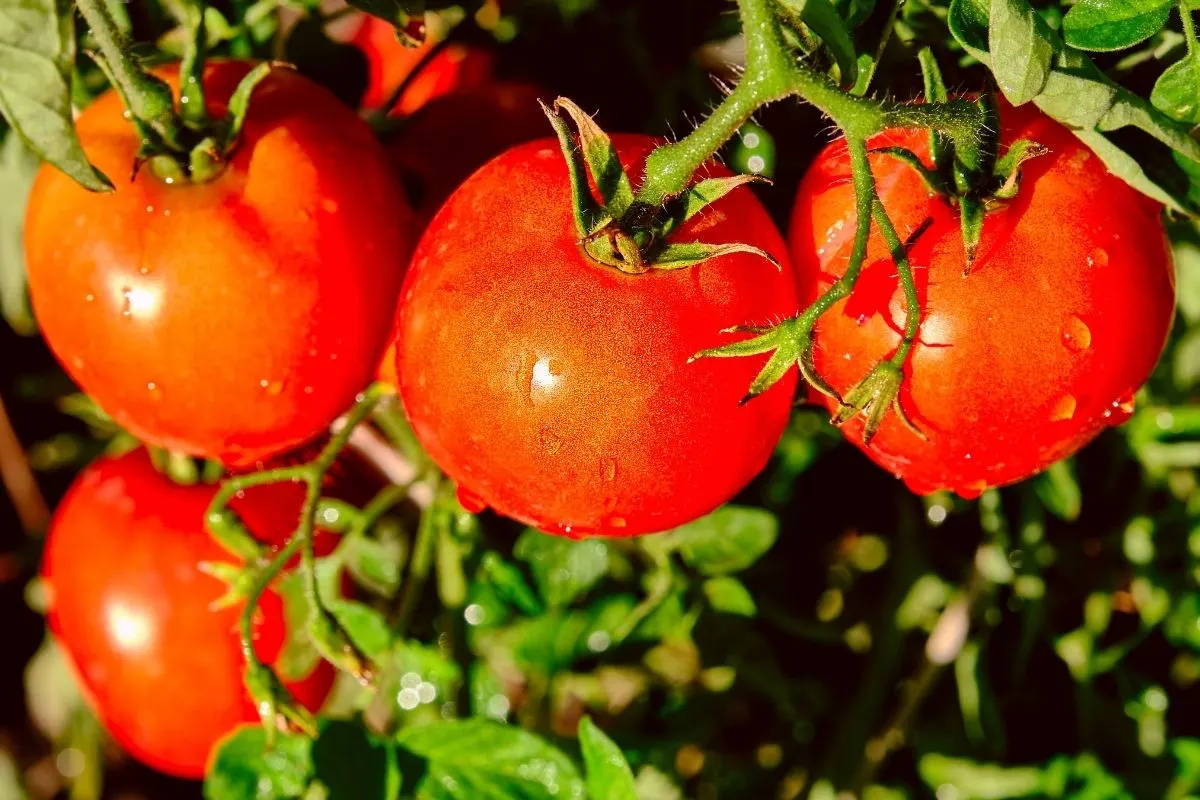
When introducing new food to your cat, they might experience some gastrointestinal issues or discomfort until their bodies adjust to the new diet. They could also experience oral irritation or signs of food allergy. It is best to introduce these new foods gradually. Some cat foods, especially wet foods for kittens and other foods specifically designed for senior cats, contain tomatoes.
Tomatoes, much like other vegetables, are rich in potassium, fiber, and vitamin C. These are essential to kittens for growth and a healthy immune system. However, there are better sources for those nutrients than tomatoes. Some feline shelters do not like using cat food containing tomatoes as they are too acidic, and some people believe they are used as fillers in the cat food.
Completely ripe tomatoes are the only part of the plant that cats can consume. Still, cats should not overeat tomatoes as they can still cause bloat, stomach discomfort, and vomiting. Because of the potential danger, it might be wise not to encourage the consumption of tomatoes at all.
What Is The Difference Between Tomatine And Solanine?
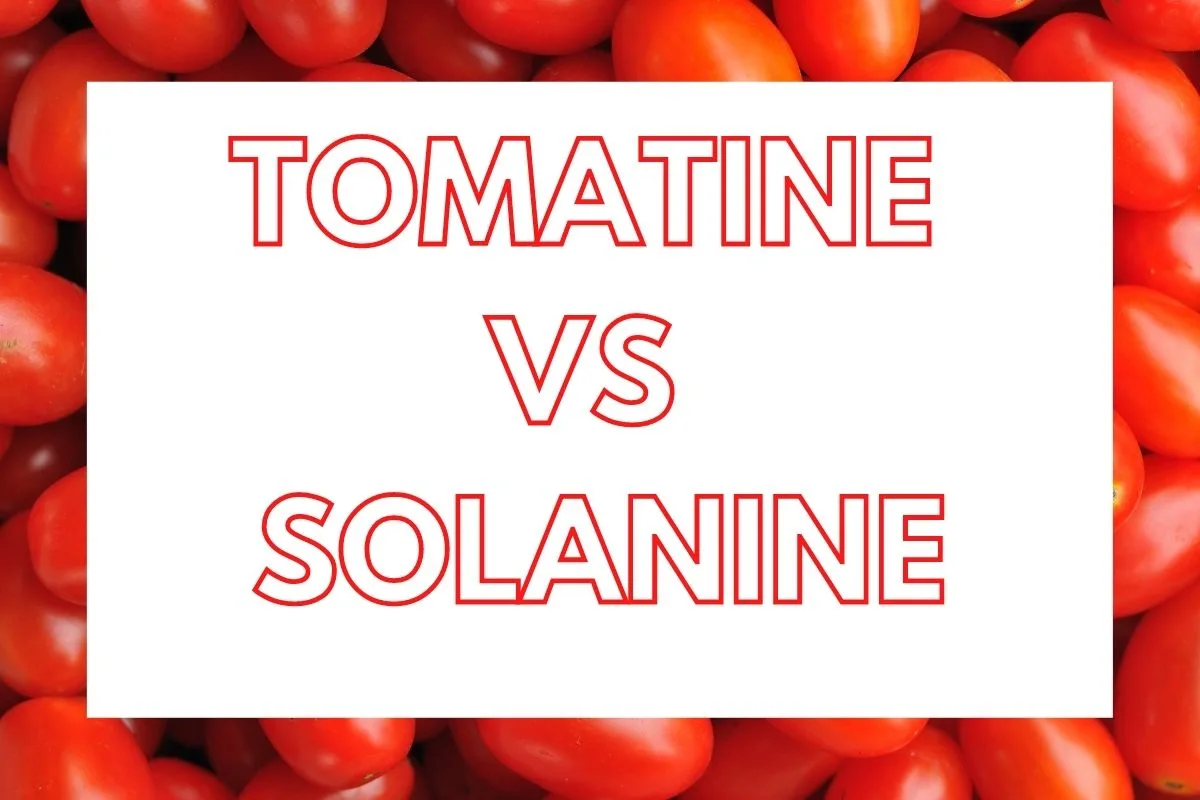
The unripe fruit and green parts of tomato plants contain a toxin called solanine. Consumed in large quantities, it will cause severe illness and discomfort for your cat. Ensure that you secure your plant behind a fence or mesh or install devices designed to keep cats away from these plants if you plant tomatoes.
Unlike other nightshade family members, such as potatoes and eggplants, the tomato plant has less solanine. The toxic alkaloid levels in tomatoes are different than those made by plants in the same family. If your cat were to ingest potatoes, for example, the consequences would be much worse and even life-threatening.
Tomatoes only contain a small amount of solanine, but it can be dangerous to cats, dogs, and even humans if ingested in large amounts. Tomatoes mainly produce tomatine which is not as toxic. Tomatine is sometimes mistaken for solanine. Tomatine, much like solanine, also contains fungicidal, antimicrobial, and insecticidal properties but in a much smaller volume.
Symptoms Your Cat Will Show From Eating Tomato Plants
Access to poisonous plants can cause a variety of symptoms in your cat. When you know what to look for, it can help you catch potential poisoning early so you can treat it fast. While the goal is always to prevent any poisoning from happening in the first place, it’s also important to know what to do in case of an emergency.
Animal lovers have a unique bond with their pets and will notice when they are not well. If you suspect or notice your cat eating some part of the tomato plant, you need to immediately identify any of the following symptoms.
- Apathy is a change of behavior: it is defined as a state in which your cat will lack emotion.
- Physical weakness
- Enlarged or dilated pupils
- Slowed heart rate – the standard heart rate for resting, a calm or relaxed adult cat is around 120 – 140 beats per minute.
- Drowsiness
- Confusion
- Central nervous system depression
- Excessive salivation
- Lack of appetite
- Diarrhea – this is usually one of the first signs of poisoning
- Extreme stomach pain
- Vomiting
If these signs are visible, it is advisable to take your cat to your vet as soon as possible. Keep your cat away from water until you reach your vet, as the solanine could have a foaming effect if agitated by water.
Treatment For Your Cat If He Eats Tomato Plants
If you suspect your cat has ingested something poisonous, you should call your vet right away. You can also call the 24-hour emergency poison hotline from the ASPCA at 1-888-426-4435.
What might a vet do to help your cat if he eats tomato plants?
The treatment by your vet is dependent on the symptoms your cat is showing. If the symptoms are severe, your vet might induce vomiting by administering a solution of water and hydrogen peroxide. Once that procedure is over, they might try and neutralize the remaining toxins by using activated charcoal.
If your cat has become dehydrated, then your vet will offer fluid replacements and electrolytes. Supplemental oxygen might also be necessary if your cat is having difficulty breathing. Cardiac symptoms might also be present and convulsions (sudden, violent or irregular movements of the body) if he ingested a large amount of the tomato plant.
If this happens, your cat could receive a tranquilizing muscle-relaxant drug. This drug causes drowsiness, and it is essential to keep an eye on him for any irregular behavior.
Usually, they will be kept at least overnight for observation and may be released after that, so long as their vitals are all good. Every case is different.
How To Protect Your Tomatoes From Your Cat
Remember, cat owners have an obligation to keep their cats safe. In addition, it’s your responsibility to keep your cat from having access to your tomatoes. This is what’s best for your tomato plants and for your cat. What are some ways you can do this?
You might consider keeping your cat indoors and creating barriers, making it impossible for him to go outside. Putting up restrictions might cause depression if your cat had access to the outside yard in the past. There are various ways to protect your tomatoes from your cats.
Secure your tomatoes behind a fence or screen so that your cat does not have access to them. Make sure your fence or screen is sturdy, as your cat might try to lean on it to push it over. Tomato caging will work, as long as your cat cannot knock it over or get inside the holes. A popular way of keeping cats out of the garden is installing motion-sensing sprinklers to scare the cats away. Most cats do not like water, and the sudden spray will frighten them.
You can also install ultrasonic noise motion detection devices. These make a noise that only your pets can hear and do not like. They tend to steer clear from these devices. As a last resort, you might consider eradicating tomatoes from your garden for the safety of your pet. Cats are curious creatures, and a form of investigating will be nibbling or even ingesting leaves and other parts of plants.
Are Tomato Plants Poisonous To Cats? – Conclusion
A good lifestyle and a healthy diet are essential to all of us, and we need to make sure our pets are also safe from plants that might be toxic. Tomatoes are some of the most popular to grow in your vegetable garden, but, as we have learned, they are very poisonous to cats. You can celebrate your love of plants and cats by doing your due diligence to keep both safe, using the tips above.
Would you add any additional tips to our list?
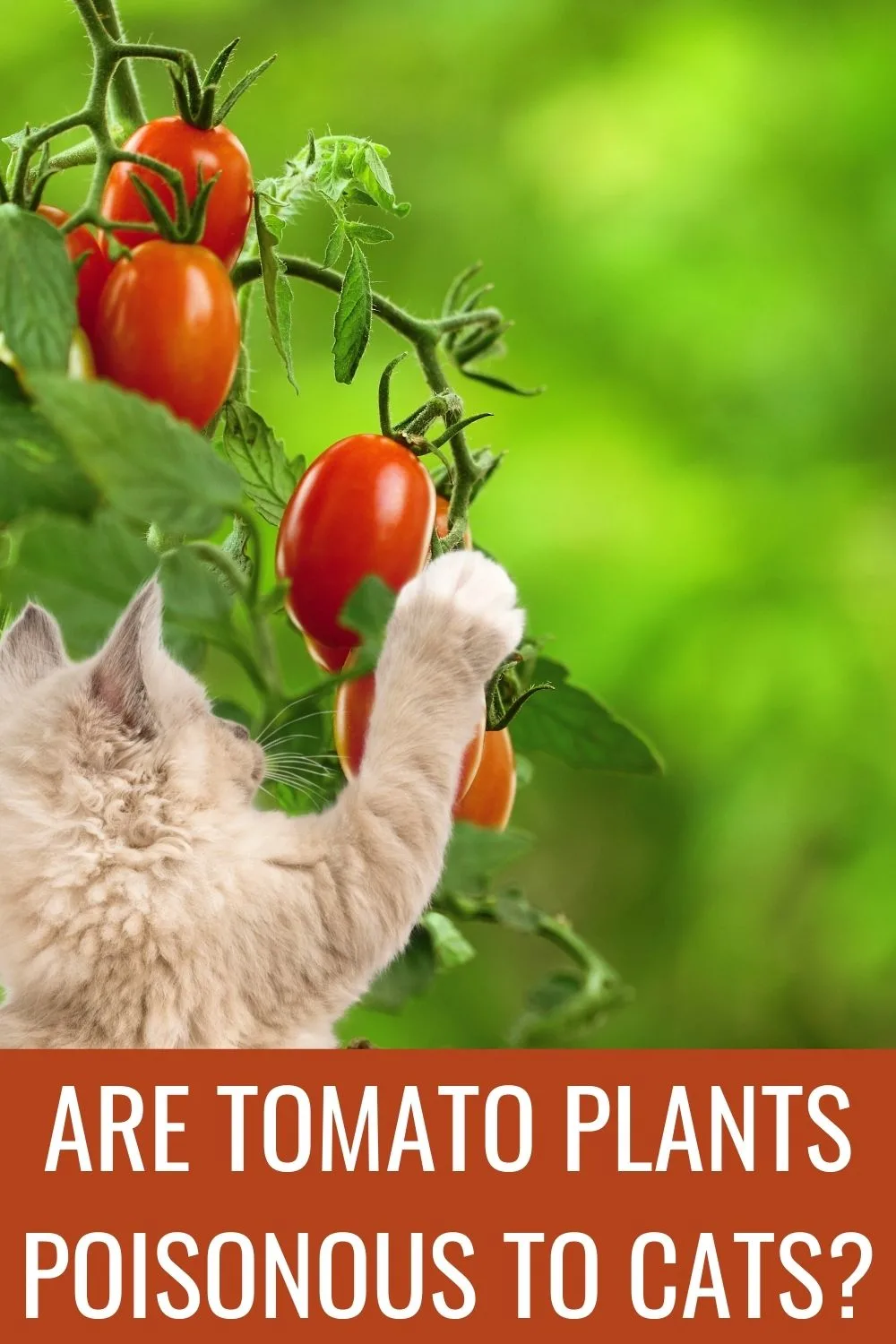
Adriana Copaceanu is a passionate nature lover living in the country on her dream property where she grows vegetables, lavender, and wildflowers that she shares with the wildlife they attract. When she's not in the garden, she loves spending time with her chickens and planning her next nature project. Check out her books below:
How to Grow Lavender for Fun and Profit: Lessons Learned from Planting Three Hundred Lavender Plants
